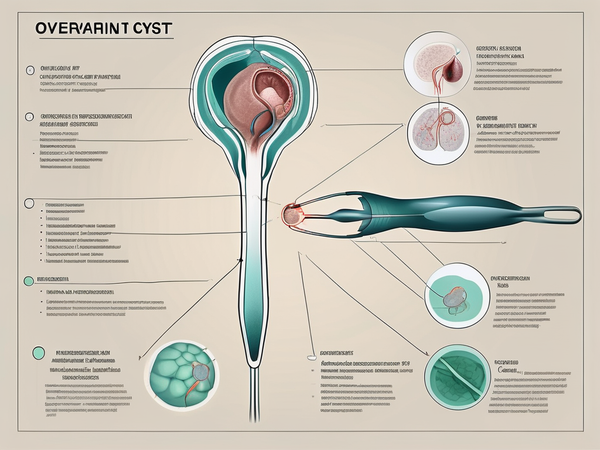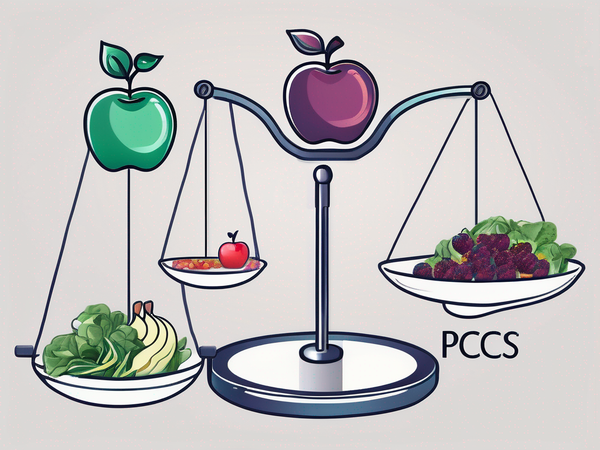PCOS, which stands for Polycystic Ovary Syndrome, is a hormonal disorder that affects many women of reproductive age. While it can present challenges and complications for those trying to conceive, it is essential to understand how PCOS impacts pregnancy and the potential complications that may arise. Additionally, the effect of PCOS on babies and the role it plays in breastfeeding should also be taken into consideration.
Understanding PCOS and Its Impact on Pregnancy
Defining PCOS: A Brief Overview
PCOS, short for Polycystic Ovary Syndrome, is a hormonal disorder that affects the ovaries, causing them to become enlarged and develop small cysts. It is characterized by an imbalance in reproductive hormones, particularly elevated levels of androgens (male hormones) such as testosterone. This hormonal imbalance can disrupt normal ovulation, resulting in irregular or absent menstrual periods.
But what does this mean for women who are trying to conceive? Let's delve deeper into the link between PCOS and pregnancy.
The Link Between PCOS and Pregnancy
Research has shown that PCOS can have a significant impact on fertility and pregnancy. Women with PCOS have a higher risk of experiencing reproductive difficulties, such as
- Infertility
- Miscarriage
- Pregnancy Complications
However, it's important to note that not all women with PCOS will struggle with fertility or have problems during pregnancy. The severity of PCOS symptoms can vary widely among individuals, and many women with PCOS can conceive and have healthy pregnancies with proper medical care and management.
The Role of Hormones in PCOS and Pregnancy
Hormones play a crucial role in PCOS and can greatly influence pregnancy outcomes. Women with PCOS often have higher levels of luteinizing hormone (LH) and follicle-stimulating hormone (FSH) than those without the condition. These hormones are responsible for the development and release of eggs from the ovaries.
Additionally, insulin resistance, which is common in PCOS, can cause the body to produce excess insulin, further disrupting hormone levels. This can hurt fertility and pregnancy, as insulin resistance can interfere with the normal functioning of the ovaries and the release of eggs.
Excessive levels of androgens in PCOS can also affect the development of eggs, impairing their maturation and quality. This can lead to difficulties in conceiving or an increased risk of miscarriage. However, with advancements in fertility treatments and medical interventions, many women with PCOS can overcome these challenges and successfully conceive.
Complications Related to PCOS During Pregnancy
Risks Associated with PCOS in Early Pregnancy
Women with PCOS may face specific risks during the early stages of pregnancy. One of the main concerns is an increased risk of miscarriage. The hormonal imbalances and irregular ovulation associated with PCOS can lead to difficulties in achieving a viable pregnancy. Women with PCOS must work closely with their healthcare providers to monitor and address any potential complications.
Long-Term Complications of PCOS in Pregnancy
During pregnancy, women with PCOS may be at a higher risk of developing certain medical conditions, such as gestational diabetes, preeclampsia, and gestational hypertension. These conditions require close monitoring and management to ensure the well-being of both the mother and the baby.
Furthermore, studies have shown that PCOS may be associated with an increased chance of preterm birth and delivering babies with higher birth weights. However, it's essential to remember that every pregnancy is unique, and not all women with PCOS will experience these complications.
Preterm birth, defined as delivering before 37 weeks of gestation, can pose challenges for both the baby and the mother. Babies born prematurely may have underdeveloped organs and may require specialized care in a neonatal intensive care unit (NICU). The mother may also face physical and emotional difficulties, as preterm birth can be unexpected and may require additional medical interventions.
On the other hand, delivering a baby with a higher birth weight can also present its own set of challenges. Larger babies may be at a higher risk of birth injuries, such as shoulder dystocia, which occurs when the baby's shoulder gets stuck behind the mother's pubic bone during delivery. This can lead to complications such as nerve damage and fractures.
The Impact of PCOS on Labor and Delivery
While PCOS itself does not directly impact labor and delivery, the complications associated with the condition may have an indirect effect. For example, women with PCOS are more likely to undergo cesarean section (C-section) deliveries due to concerns such as gestational diabetes, preeclampsia, or the baby's size.
Women with PCOS must discuss their medical history, symptoms, and concerns with their healthcare providers from early pregnancy stages. Regular monitoring and closer observation can help manage any potential issues that may arise during labor and delivery.
In addition to the potential complications mentioned earlier, PCOS can also affect the progress of labor. Women with PCOS may have a higher likelihood of experiencing prolonged labor, which can be physically and emotionally exhausting. It may require interventions such as the use of oxytocin to stimulate contractions or the use of forceps or vacuum extraction to assist with the delivery.
Furthermore, PCOS can also impact the postpartum period. Women with PCOS may have a higher risk of developing postpartum depression, a mood disorder that can affect a mother's ability to care for herself and her baby. Healthcare providers need to be aware of this risk and provide appropriate support and resources to women with PCOS during this vulnerable time.
The Effect of PCOS on Babies
Potential Health Risks for Babies Born to Mothers with PCOS
Babies born to mothers with PCOS may face certain health risks. Research suggests that they may have a slightly higher chance of being born prematurely or with higher birth weights. These factors can increase the risk of complications both during delivery and in the immediate postnatal period.
Additionally, babies born to mothers with PCOS have a slightly increased risk of developing conditions such as metabolic syndrome, obesity, and insulin resistance later in life. However, the absolute risk is still relatively low, and many babies born to mothers with PCOS are perfectly healthy and develop normally.
The Influence of PCOS on Newborn Development
PCOS does not directly affect newborn development. However, some studies have suggested that there may be differences in the hormone levels of newborns born to mothers with PCOS. These differences are believed to be a result of the hormonal imbalances associated with the condition and are not necessarily indicative of any long-term health issues.
Understanding the Genetic Implications of PCOS
PCOS is thought to have a genetic component, meaning that it can be passed down from parent to child. However, the exact genetic factors contributing to PCOS are still being investigated. If you have PCOS, it is important to discuss your family history with your healthcare provider, as it may help them better understand and manage your condition.
PCOS and Breastfeeding: What You Need to Know
The Relationship Between PCOS and Lactation
PCOS can affect lactation (milk production) due to hormonal imbalances. Some women with PCOS may experience challenges with establishing and maintaining an adequate milk supply. However, it's important to note that not all women with PCOS will face breastfeeding difficulties, and with proper support and guidance, it is often possible to overcome these challenges.
Overcoming Breastfeeding Challenges with PCOS
If you have PCOS and are planning to breastfeed, it's crucial to seek support from lactation consultants and healthcare providers experienced in managing breastfeeding challenges associated with PCOS. Proper nutrition, maintaining adequate hydration, and breastfeeding on demand can help optimize milk production and ensure the health and well-being of both the mother and the baby.
Nutritional Considerations for Breastfeeding Mothers with PCOS
Women with PCOS who are breastfeeding should also pay attention to their nutritional needs. Maintaining a balanced and healthy diet can support both the lactation process and the overall well-being of the mother.
Opting for whole, nutrient-rich foods and avoiding excessive intake of sugary and processed foods can help manage insulin resistance, which is often associated with PCOS. Additionally, discussing any concerns or specific dietary needs with a healthcare provider or a registered dietitian can provide personalized guidance regarding nutrition during breastfeeding.
How to Manage Pregnancy with PCOS
Managing pregnancy with PCOS involves a multi-faceted approach. Here are some key considerations:
- Regular Prenatal Care: Regular check-ups with an experienced healthcare provider are crucial for monitoring both the mother's and the baby's health.
- Managing Insulin Resistance: Insulin resistance is common in PCOS and can be managed through diet, exercise, and, in some cases, medication prescribed by a healthcare provider.
- Fertility Treatments: For women with PCOS who are struggling to conceive naturally, fertility treatments such as ovulation induction or in vitro fertilization (IVF) can be explored.
- Monitoring Blood Sugar Levels: Regular monitoring of blood sugar levels is essential for women with PCOS, as they are at a higher risk of developing gestational diabetes during pregnancy.
- Managing Weight: Maintaining a healthy weight through proper nutrition and regular exercise can help manage PCOS symptoms and reduce the risk of complications during pregnancy.
- Emotional Support: Pregnancy can be emotionally challenging, especially for women dealing with the additional complexities of PCOS. Seeking emotional support, whether through friends, family, or support groups, can provide invaluable assistance throughout the pregnancy journey.
Conclusion
While PCOS may present unique difficulties, it's important to remember that with proper healthcare, management, and support, many women with PCOS can conceive, have healthy pregnancies, deliver healthy babies, and breastfeed successfully. Working closely with healthcare providers, implementing lifestyle changes, and seeking emotional support can make a significant difference in managing the unique aspects of PCOS during pregnancy.



























 DOWNLOAD NOW
DOWNLOAD NOW
